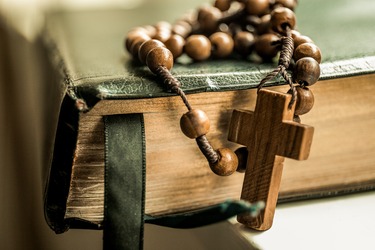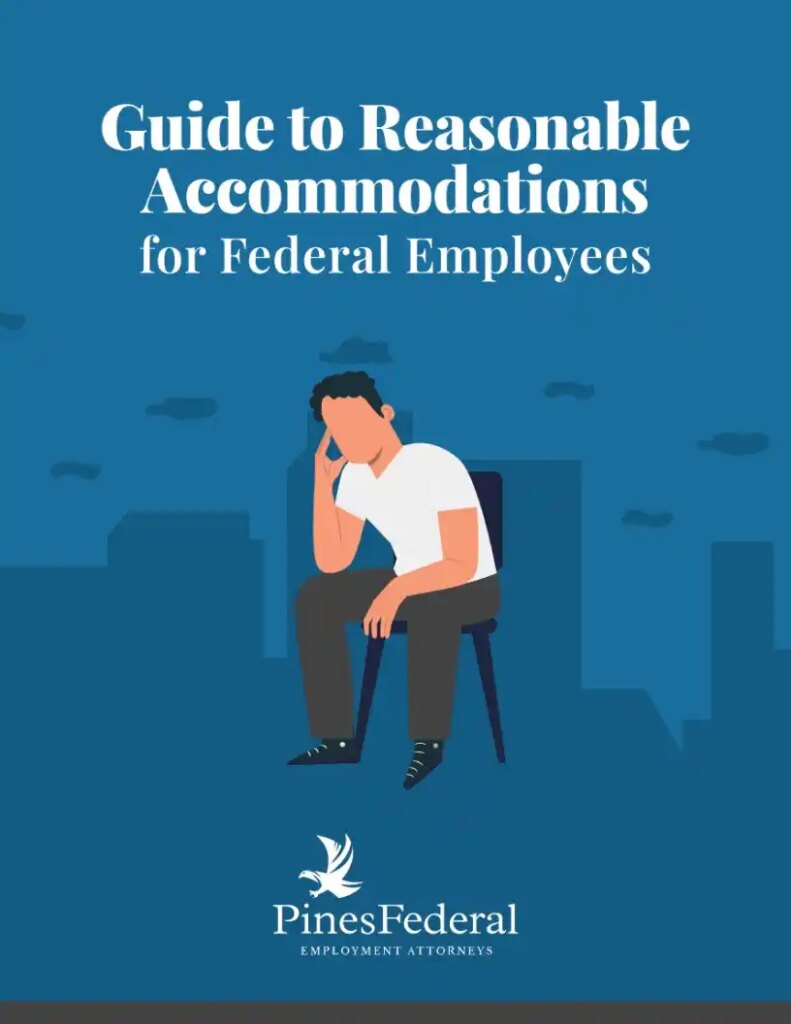
Religious accommodation in the workplace is a constitutional right for those federal employees who have strong ethical or religious beliefs.
This right was recently strengthened by the Supreme Court in the case of Groff v. U.S. Postal Service. In that case, the court reiterated that employers need to meet a relatively difficult standard in order to deny an employee’s requested religious accommodation.
However, what does religious accommodation look like in the workplace? We’ll cover several religious accommodation examples in this article. If you’ve been curious about what kinds of religious accommodation you might be able to receive, then you’ll want to read on.
And if you’d like to learn more about a specific example of religious accommodation, contact our outstanding team of federal employee accommodations lawyers. We’re happy to discuss your religious accommodation legal rights and answer any questions you may have.
Call us at (800) 801-0598 or send an online message today to get started.
Six Examples of Religious Accommodations for Work
Without further ado, let’s dive into specific examples of religious accommodation.
1. The USPS Driver’s Sabbath
John is a devout Seventh-day Adventist who works as a postal carrier for the U.S. Postal Service in Springfield, Illinois. His religious beliefs strictly prohibit him from working from sunset on Friday to sunset on Saturday because that is the sabbath for Seventh-day Adventists.
Recently, the U.S. Postal Service implemented a new scheduling system that required John to work on Saturdays. He informed his supervisors of his religious commitments and requested accommodation to have Saturdays off.
Alternatively, he asked that his employer allow him to swap shifts with a colleague. After some consideration, his supervisors granted his request.
2. The Contractor’s Hijab
Amina is a practicing Muslim woman who works as a public liaison at the Department of Justice in Washington, D.C. At the time of Amina’s hiring, the DOJ had a formal dress code for public-facing roles that did not accommodate head scarves or any head coverings.
Amina wears a hijab as part of her religious practice, so she approached her department head to request an exception. Her department head initially told her that the dress code was standard across all federal departments and that no waivers or exemptions were possible.
Feeling that her religious rights were not being acknowledged, Amina filed a complaint. After reviewing the case, DOJ’s upper management recognized the importance of religious accommodation and adjusted its dress code guidelines. Now, Amina and others can wear religious garments that align with a professional appearance.
3. The Researcher’s Daily Prayer
Sikha is a devout Hindu who works as a researcher for the Centers for Disease Control in Georgia. Her religious beliefs require her to observe a short, 10-minute prayer ritual at noon each day.
Originally, the lab had strict schedules for experiments and breaks that allowed Sikha to conduct her prayer ritual. However, the CDC lab introduced new timings last year.
When that happened, Sikha found that her noon prayers conflicted with an essential task. She brought this to the attention of her supervisor and explained the significance of her religious observance. Her supervisor was initially hesitant to make any changes because of the potential disruptions.
However, Sikha suggested adjusting her start and end times to ensure she finished her tasks without affecting the lab’s operations. After learning about the applicable laws from an HR representative, Sikha’s supervisor recognized the legal importance of religious accommodation and granted Sikha’s request.
4. The Vegan Baker’s Festival Dilemma
Lakshmi is a committed follower of Jainism, working as a chef with the Department of the Army in North Carolina. An integral tenet of her faith is Ahimsa, which advocates non-violence. This principle drives many Jains to adopt a strict vegan diet.
Every year, the military facility at which Lakhsmi works has a Fourth of July festival for local DoD military members, civilians, and contractors. Lakshmi’s organization planned to showcase a special cream-filled pastry and barbeque ribs as the festival approached.
Lakshmi approached her manager, expressing her discomfort in preparing dishes that go against her religious dietary restrictions. She proposed creating an equally delectable vegan alternative that would appeal to a broader audience, including vegans and lactose-intolerant attendees.
Recognizing both the value of inclusivity and Lakshmi’s dedication, her manager enthusiastically supported her idea. The vegan pastries were a hit at the festival.
5. The OGC Attorney’s Yom Kippur
Rachel is a dedicated attorney for the Department of the Interior’s Office of the General Counsel in Washington, D.C.
As an observant Jew, she faithfully observes Yom Kippur, the Jewish day of Atonement. This holiday requires all faithful adherents to fast and abstain from work. Unfortunately, a crucial client meeting was scheduled on the same day as Yom Kippur.
Rachel reached out to her senior manager and explained the significance of the holiday and her need to be absent from work that day. She suggested rescheduling the meeting or having a colleague represent her. At first, the manager was highly reluctant to grant Rachel’s request.
However, after Rachel reminded him of the government’s legal obligation to provide accommodation, the partner conferred with his peers and granted Rachel’s request.
6. The SES’s Meditation Retreat
Tenzin is a top-performing member of the Senior Executive Service with the Department of Commerce.
As a devout Buddhist, Tenzin prioritizes attending an annual 10-day silent meditation retreat to rejuvenate his mind and deepen his practice. This year, the retreat coincided with an important training conference.
Tenzin communicated his predicament to his superior, making sure to highlight the spiritual importance of the retreat. Due to his key role in the training conference, he proposed creating a comprehensive action plan and delegating tasks to a trusted colleague during his absence.
After Tenzin’s supervisor understood the essential nature of the annual meditation and the effectiveness of Tenzin’s comprehensive action plan, he granted the request.
Common Religious Accommodation Requests in the Federal Workplace
As microcosms of American society, the federal workplace is the place of many requests for religious accommodation. Understanding the most common of these can help foster a more inclusive and supportive work environment for all employees.
Here’s a look at frequently encountered requests.
- Sabbath and religious holidays. Employees belonging to groups like Seventh-day Adventists or Orthodox Jews might request accommodations to observe the Sabbath or specific religious holidays. This can include time off or adjustments to their work schedules.
- Daily prayers. Muslim employees might request short breaks during the day to perform their mandatory prayers. These breaks are often during the early morning, noon, mid-afternoon, sunset, and evening.
- Dietary restrictions. Some religions have specific dietary guidelines, like halal for Muslims, kosher for Jews, or vegetarianism for some Hindus and Buddhists. Employees may request accommodations in workplace cafeterias or during work-related events.
- Dress and appearance. Employees might wear religious garments like hijabs, turbans, or yarmulkes as a part of their religious practice. Accommodating these often involves flexibility in dress codes or uniform policies.
- Religious symbols. Employees might wish to display religious symbols at their workstations like crosses, Stars of David, or verses from holy scriptures.
- Time for religious or spiritual retreats. Some religious practices, like Buddhism or certain Christian denominations, emphasize periodic retreats for spiritual renewal. Employees might request time off for these retreats, even if they don’t coincide with official holidays.
- Conscientious objectors. In some cases, employees might have religious objections to performing certain tasks or being involved in specific projects. This is common in healthcare settings or research roles where the work might conflict with one’s religious beliefs regarding issues like end-of-life care or animal testing.
These are just a few of the more common religious accommodation requests. Unusual requests are also possible. Requests that relate to minority or fringe religions are also valid.
In addition to being the law, religious accommodation allows the beauty of American religious diversity to shine through the federal workplace. Moreover, fostering a respectful and understanding workplace culture enhances morale, reduces potential conflicts, and enriches the collective experience of every federal employee.
Our Federal Employment Attorneys Can Help You Secure The Workplace Religious Accommodations You Need
Hopefully, these inspiring examples illustrate the vast range of possibilities for religious accommodations you can obtain. Yet maneuvering through the numerous twists and turns of federal employment law can be daunting.
At Pines Federal, our primary mission is to advocate for federal employees embroiled in all kinds of workplace challenges, including religious accommodation issues.
Drawing inspiration from cases like Amina’s hijab request, John’s Sabbath observance, and Sikha’s noon prayer considerations, our legal experts excel in navigating the complex terrain of religious accommodation in federal employment. Trust in our firm to harness all of our resources to ensure your religious rights are respected and protected in your workplace.
If you’re ready to protect your rights, our team at Pines Federal is ready to stand as your workplace champions. Contact us online or call (800) 801-0598 today to schedule a consultation.
[DOWNLOAD] Reasonable Accommodations for Federal Employees
